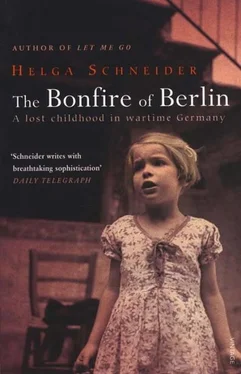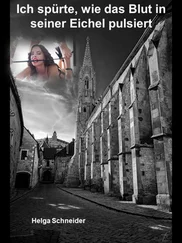Helga Schneider
THE BONFIRE OF BERLIN
A LOST CHILDHOOD IN WARTIME GERMANY
Translated from the Italian by Shaun Whiteside
‘Adolf Hitler is nothing but a vain bohemian from the streets. That people should be afraid of him is something that is really beyond my understanding.’
President Hindenburg on the occasion of a meeting between General Schleicher and the Bishop of Münster, 4 February 1931
We hurried up the stairs of the old Viennese building, my heart thumping so hard that I couldn’t ring the bell. Renzo, my son, rang it for me.
I had been looking for her for a long time. Now, thirty years after she had abandoned me in a Berlin already traumatised by war, I had found my mother again; she was back in Vienna, her home-town.
As for myself, I’d been born in Poland, I’d lived in Nazi Germany and been repatriated to Austria (also the country where my father had been born), and now I was settled in Italy; I had a husband and a son.
When the door opened, I saw a woman who looked strikingly like me. I gave her a tearful hug, overwhelmed by happiness and disbelief, and ready to understand, to forgive, to let bygones be bygones.
She immediately started talking, talking about herself. There was no attempt to justify her abandoning of me, no explanation of any kind.
She told me her story. Many years previously, she had been arrested in Birkenau concentration camp, where she had been a warder. She had been wearing an impeccable uniform ‘that suited her terribly well’. Before twenty minutes bad passed, she was opening a horrible wardrobe to show me, nostalgically, that very uniform. ‘Why don’t you try it on? I’d like to see it on you.’ I didn’t try it on; I was confused and upset. But what she then said was even worse, a denial of her role as a mother. ‘I was condemned by the Nuremberg Court to six years’ imprisonment as a war criminal, but none of that matters anymore. With Nazism I was somebody. Afterwards I was nothing.’
My blood froze. If she, in 1941, had decided that she didn’t want her daughter, it was my turn not to want my mother! My son and I took the first train back to Italy. Renzo wept with disappointment. How could I explain why I hadn’t found a mother, and he hadn’t found a grandmother? He was only five years old.
So I lost my mother for the second time. I don’t know if she’s still alive. Every now and again people ask me whether I’ve forgiven her.
My mother was a blonde woman who shouted ‘Sieg Heil’ whenever Adolf Hitler appeared at rallies. Sometimes she brought me along, and one day I got lost in the crowd, finding myself alone when the square had emptied. My grandmother told me the story often, her words heavy with the hatred she felt for her daughter-in-law.
When my brother, Peter, was born, my mother discovered she had chosen the wrong career. Having convinced herself that serving the Führer’s cause was more honourable than raising her own children, she abandoned us in a flat in Berlin-Niederschönhausen and enlisted in the SS. It was the autumn of 1941; the German forces were suffering badly on the Russian front.
We were taken in by Aunt Margarete, my father’s sister. My father had left for the front some time before. Aunt Margarete lived in a villa in Berlin-Tempelhof, had a daughter, Eva, and was married to a count who was off fighting in the war as well.
At my aunt’s villa, food rationing was unknown; the table was always groaning with foie gras, canapes, various kinds of sausage, apple juice and fresh bread. I often stuffed myself until I could eat no more, only to throw it all up again, to my aunt’s great consternation. I was four years old, my brother, Peter, nineteen months.
One day Aunt Margarete sent two cablegrams: one to my father, informing him of his wife’s desertion, news that gave him an attack of jaundice; the other to our paternal grandmother, who immediately put my father’s elder sister in charge of her already impoverished farm and rushed from troubled Poland to equally troubled Berlin.
My grandmother arrived smelling of poultry and aniseed biscuits, deposited her suitcase and her umbrella by the empty swimming pool, cast a withering glance at the liveried butler with his Hitler moustache who was fawning on my aunt with ludicrous zeal, and started swearing like a trooper. Calling my mother a Nazihure , a Nazi whore, she considered our fate. She had clear ideas about what should happen to us.
Aunt Margarete was willing to bring up Peter and me along with Eva, but my grandmother was having none of it. Worried that her daughter would turn us into two little manikins, she insisted on taking us to Poland. The two women had a heated conversation beside the pool. Soon another cablegram made its way to the front, but it was my father’s view that we should stay in Berlin. So our grandmother settled with Peter and me in the Niederschönhausen flat to await developments. She eradicated all traces of my mother, as though the house had been infested with plague. However, she found a way to renew her memory every day by talking about her in unrepeatable terms, adding fresh hatred to old rancour.
Grandmother was both loving and severe. She punished me without hesitation whenever I told lies, and I told them often. I liked to go around saying, for example, that my father was a famous General, while in reality he was only a soldier in an anti-aircraft division, and furthermore he was a fervent antimilitarist. An Army career had always been the least of his ambitions. His presence in Berlin had a great deal to do with the fact that his sister Margarete lived there; being so well connected, it seemed likely that she would be able to able to open a few doors for him. He had found himself involved in the war in spite of himself, due to the German annexation of Austria. Having been born in Vienna, he was irritated at having to wear the uniform of the Wehrmacht , though such sentiments were not openly expressed in those days.
My lie about my father the General was the product of a need to overcompensate. I had been deprived of maternal warmth, and although I loved my grandmother very much, I had focused my entire being on my father. But as he was far away, it was essential for me to create a fantasy substitute for myself. That is why I devised the legend of my father the General, a fantasy that gave me great consolation, particularly when other people expressed their admiration for this ‘hero of the Fatherland’! Who could command greater respect than a brave General fighting to save the German people from Bolshevism?
In Niederschönhausen there was a cobbled yard called the Böllerhof . Our grandmother took us there to play. All the children loved her for her cheerfulness. She had a vivid imagination and a rather girlish manner. She was always making up new games, allowing us to forget the war for a while. She would sing in Polish, and we would listen with delight even if we didn’t understand a word. In that bare yard she sang and danced, moving with grace, with an innocent, traditional spontaneity; everyone loved her, and I was sometimes jealous of her. But often, in the middle of her performances, the sirens would scream, and we would have to run to the shelter in the cellar. The spell would be broken.
Grandmother was fat and poetic, and blessed with a keen intelligence. She listened to the BBC in secret and told us about the course the war was taking, although Peter and I didn’t understand what she was talking about. We knew only that war meant hunger, sirens, fear and bombs. To help us go to sleep, Grandmother told us fairy-tales from the Black Forest in a mixture of German and Polish. Her voice gave us the reassurance we so badly needed.
Читать дальше












